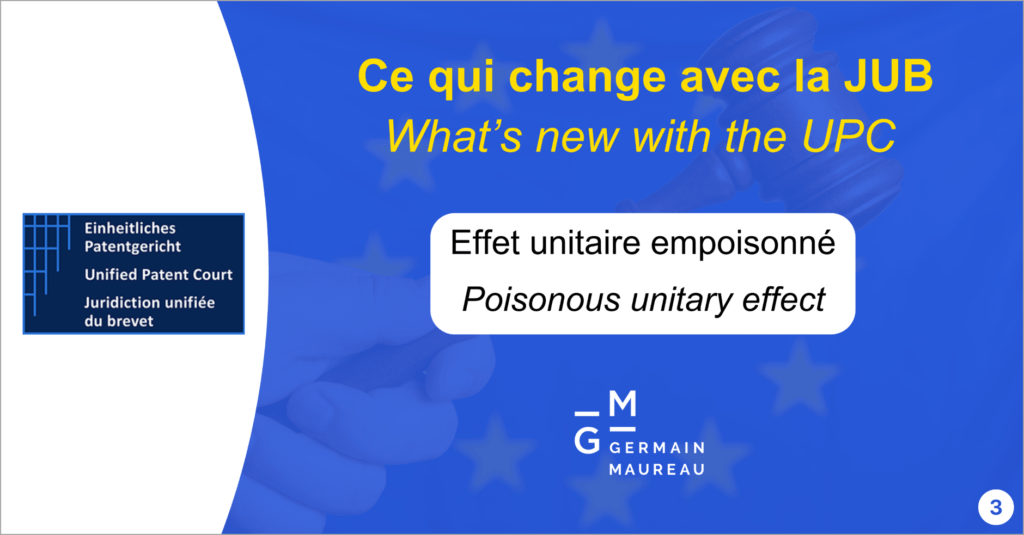“Poisonous unitary effect”, what’s new with the UPC
[28/09/2023]

In our last article in the series “What’s new with the UPC”, we showed that the existence of a prior national right (a national patent application from a European State, with a priority date prior to that of the European patent in question, but published afterwards) could create a serious risk of invalidation of a European patent with unitary effect (“unitary patent”), at least according to an interpretation of the texts which, while yet to be confirmed by case law, is not particularly exotic.
If such prior national rights are rare in practice, when assessing such risk one does not necessarily think of … a priority application of the European patent.
1. Situation for classic European patents
Indeed, if the European application is an extension of an earlier national application from a European State, the European application normally claims its priority in order to benefit from the same date. However, in the event of invalid priority, the national application will have a priority date prior to that of the European patent in question, even though it will be published later. And the two applications generally have more or less the same content.
This could happen in many cases, notably if the European application is filed too late and the 12-month priority period is missed without restoration being possible, if the priority document is not provided on time, if there is a problem with the assignment of the priority right, or simply if no priority has been claimed.
For a classic European patent, the absence of a valid priority is only problematic in the case of intermediate disclosure. In fact, the priority application, if published after the European application has been filed, constitutes a prior national right which would only anticipate the European patent for the corresponding State. The validity of the European patent would not be affected in the other States, and in the concerned State one would still benefit from national protection via the national patent issued for this priority application, if this patent has been maintained in force.
2. Unitary patents
On the other hand, it should be remembered that a unitary patent “may only be limited, transferred, revoked or lapse, in respect of all participating Member States” (Article 3(2) of Regulation n°1257/2012), so that if we apply the law literally, the priority application as prior national right would almost automatically cause a loss of protection in all States participating in the Unified Patent Jurisdiction (UPC) Agreement. The unitary patent could only survive to the extent that it could be limited to any new additions to the priority application.
In this respect, as soon as the priority is questionable, the unitary effect can be qualified as “poisonous”, by analogy with the case of poisonous divisionals whose filing could lead to the invalidity of their parent application. This situation caused a great deal of uncertainty until decision G1/15 of the Enlarged Board of Appeal of the European Patent Office (EPO), which allowed the existence of partial priorities even for elements not disclosed in the application.
3. How to could we prevent this risk if interested in the unitary effect?
Where there is concern that the priority may not be valid, a solution to avoid any risk of a poisonous unitary effect would seem to be to withdraw the priority application before publication.
Thus, if the priority were, for one reason or another, effectively invalidated, there would no longer be any opposable prior national right.
However, this has a drawback: the national application, which had the earliest filing date, is lost. Consequently, if a disclosure occurred between the filing date of the national application and the filing date of the European patent application, the validity of the unitary patent could be challenged, and there would not even be a surviving national patent, since the corresponding application would have been abandoned.
Such a decision can only be taken on a case-by-case basis, and requires careful consideration of the pros and cons before taking action.
4. A risk that could go beyond just cases of questionable priority
Going a step further, the UPC is not bound by EPO case law, and could challenge decisions on the assessment of the priority right.
In an extreme hypothetical scenario, the UPC could thus in theory overturn the G1/15 decision of the Enlarged Board of appeals referred to above, and re-establish a stricter assessment of the notion of “same invention” in line with the G2/98 decision. As a result, all European patents in which the claimed subject matter has been generalized at the time of extension would lose their priority, and the priority application would become a national right systematically destroying novelty. In the case of classic European patents, this would only affect the patent in the State of the national priority application. And for those with unitary effect, as explained above, the validity of the entire European patent could be affected!
Thus, the unitary effect could theoretically place a sword of Damocles over any European patent claiming priority.
Our teams are available for any further information.
